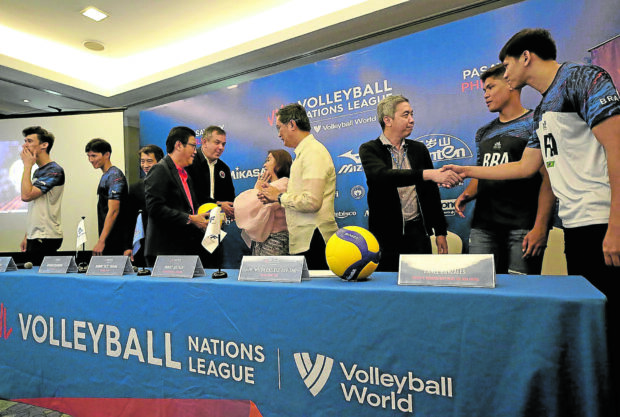
National team players mingle with sports and government officials including Philippine Sports Commission Chair Richard Bachmann, PNVF president Ramon Suzara, Pasay City Mayor Imelda Calixto-Rubiano and Senior Deputy Executive Secretary Hubert Guevara. —RICHARD A. REYES
Marck Espejo felt it. Jao Umandal, too.
In 2019, after a historic run by the national volleyball team in the Manila Southeast Asian (SEA) Games, the men’s game was getting the kind of recognition and love that it had never experienced before.
“The men’s games were already live in the UAAP and it felt good that we were already getting recognized,” Umandal told the Inquirer on Tuesday during a press briefing for the Volleyball Nations League (VNL).
Espejo, easily one of the most popular and accomplished volleyball standouts in the country, said the national team’s run in that SEA Games—where the squad finished with a silver after beating powerhouse Thailand in dramatic fashion in the semifinals—was huge for the men’s program.
“I felt it was a turning point for men’s volleyball,” the star outside hitter out of Ateneo said.
But then the COVID-19 pandemic got in the way.
“After that, everything went back to zero and it was not easy to get things going again,” Espejo, who played as an import in South Korea, said.
But the VNL holding one of its legs in the Philippines—a crucial one at that—may just be the kind of thing needed to hot-wire men’s volleyball’s rise.
“We will have the top teams in the world,” said Philippine National Volleyball Federation (PNVF) president Ramon “Tats” Suzara. “We have Italy, the champion last year and we also have Poland, the silver medalist last year. We also have Brazil.”
The Manila leg will be the third in the current series, and teams are expected to send their best squads to gain better records entering the final leg in Poland.
Thus, getting visiting squads to play friendlies against the men’s national team, which will compete in the coming Asian Volleyball Confederation, wasn’t easy.
“I requested Japan [to play a friendly against the Philippines] but the third week is very crucial because that’s when teams send their best players. So these teams want to be careful before heading into the finals in Poland,” Suzara said.
The Philippines against host Cambodia in the SEA Games 2023 men’s volleyball competition. –CAMBODIA 2023
Instead, the Philippines will get to play two visiting squads: the Netherlands and China.
“Playing against the top teams in the world is great training for [us]. We haven’t seen this kind of talent ever,” national team standout Steven Rotter said.
But even with the men’s team experiencing the VNL from the sidelines, there is much to be gained for their program.
“As a professional athlete, some of [the foreign standouts] I already played against,” Espejo said. “But the perspective is different when you’re watching the game. As a spectator … you see a new system, new technique, something new that I can use when I play.”
Tony Boy Liao, part of the Sports Vision management group that runs Spiker’s Turf, the club tournament for men, said the last time the VNL was played here, the men’s game benefited a lot.
“Right away, you could see the effect on men’s volleyball. The interest increased,” Liao said.
Umandal, the outside hitter from University of Santo Tomas, added that the VNL breathes more life into the dreams of players like him.
“[The VNL] shows us how volleyball is played in other countries, where the technique and level are higher,” he said. “Every year, their system improves.
“My teammates and I also dream that someday, we will be able to play [in the VNL]. It’s a long shot, but if we’re going to dream anyway, why not dream big?”